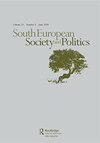经济大衰退是否造就了批判公民的危机一代?来自南欧的证据
IF 4.6
1区 社会学
Q1 POLITICAL SCIENCE
引用次数: 3
摘要
摘要本文探讨了在经历了一段异常激烈的政治时期后,南欧可能出现的“新”和“关键”政治一代。使用国家特定的政治世代分类,我们首先描述了对政治制度的两种主要态度组合的演变-政治讨论的频率和对民主的满意度-然后提出了四种类型:快乐,批判,不参与和幻灭的公民。基于政治社会化理论,我们假设,在大衰退期间形成其主要政治态度的危机一代,从长远来看将特别关键,将不满与政治参与结合起来。为了确定这一潜在的新一代,我们使用纵向视角和1985年至2019年的欧洲晴雨表数据,并寻找实证支持,以确定西班牙和希腊的这一“关键一代”。相比之下,意大利和葡萄牙的结果表明,对民主运作方式感到满意并参与政治的幸福公民有所增加。本文章由计算机程序翻译,如有差异,请以英文原文为准。
Has the Great Recession Shaped a Crisis Generation of Critical Citizens? Evidence from Southern Europe
ABSTRACT This article examines the potential emergence of a ‘new’ and ‘critical’ political generation in Southern Europe after an exceptionally intense political period. Using country-specific classifications of political generations, we first describe the evolution of a combination of two main attitudes towards the political system – frequency of political discussion and satisfaction with democracy – and then propose a fourfold typology: happy, critical, unengaged and disillusioned citizens. Grounded on political socialisation theories we hypothesise that the crisis generation, which developed its main political attitudes during the Great Recession, will be particularly critical in the long term, combining dissatisfaction with political engagement. To identify this potential new generation, we use a longitudinal perspective and Eurobarometer data from 1985 to 2019 and find empirical support to identify such a ‘critical generation’ in Spain and Greece. In contrast, results in Italy and Portugal suggest an increase in happy citizens who are satisfied with how democracy works and who are politically engaged.
求助全文
通过发布文献求助,成功后即可免费获取论文全文。
去求助
来源期刊

South European Society and Politics
Multiple-
CiteScore
5.80
自引率
21.20%
发文量
14
期刊介绍:
A leading point of reference for scholars of Southern Europe, South European Society and Politics promotes both comparative and inter-disciplinary analyses, as well as offering innovative single county and sub-national studies. The journal acts as a forum for social, economic, cultural, contemporary historical and political approaches to research on the region, and is particularly keen to sponsor policy–focused studies in all these disciplines. The journal publishes research articles; South European Atlas with election reports and articles on other subjects of topical interest, and an extensive book reviews section, including both review articles and individual book reviews.
 求助内容:
求助内容: 应助结果提醒方式:
应助结果提醒方式:


